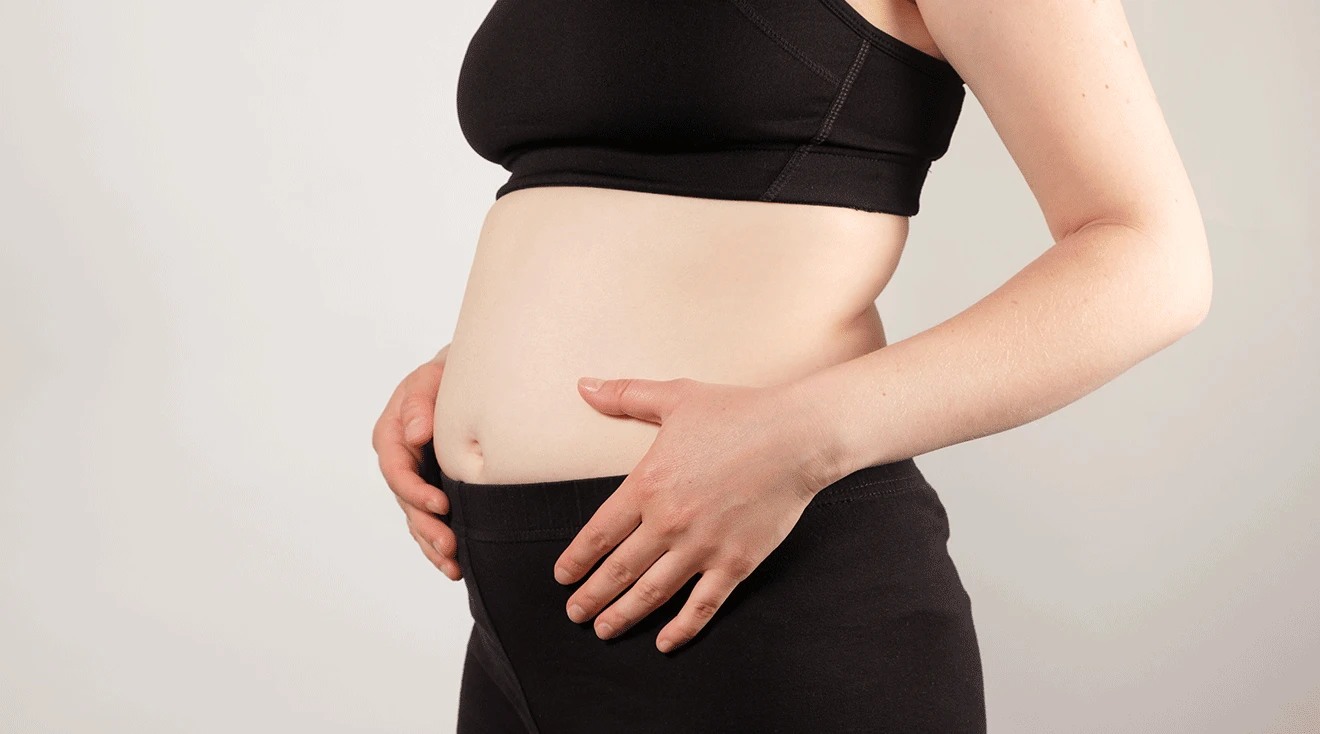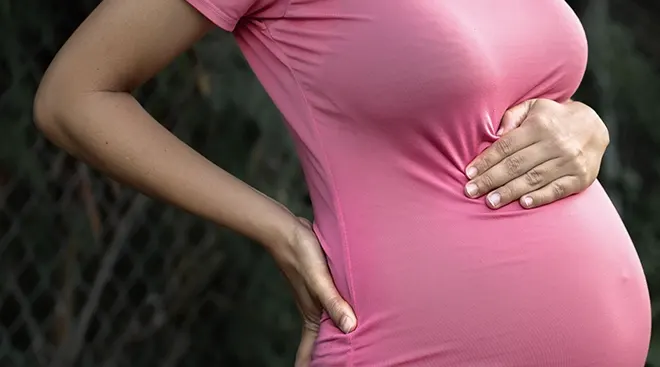What’s the Deal With Pregnancy Bloating? (and How to Get Relief)
There’s a lot happening in your body in early pregnancy—you’re growing a whole human being, after all. But there are also a lot of early pregnancy symptoms that can catch you off-guard. Pregnancy bloating—along with gas and other unpleasant stomach issues such as indigestion—is definitely on that list. It’s important to point out that bloating during pregnancy is completely normal. That said, it can be incredibly uncomfortable.
If you’re experiencing bloating in early pregnancy, and it’s bothering you, you’re not alone. Here’s what you should know about what causes pregnancy bloating, how to relieve it and more.
Bloating is when your belly feels full and tight, usually due to gas, according to Johns Hopkins Medicine. That said, everyone experiences bloating a little differently. “Bloating can mean that feeling the things you ate are not moving as fast as expected and the slowdown is uncomfortable,” says Matthew Carroll, MD, assistant professor of obstetrics and gynecology at Baylor College of Medicine and Texas Children’s Hospital. “It can mean feeling abdominal swelling or excess water weight. Finally, it can be a number of sensations associated with the growing uterus itself.”
Bloating can cause cramping and other symptoms. “Bloating and excess gas can give you abdominal discomfort or cramping and make you feel full and uncomfortable,” adds Julie Lamppa, APRN, CNM, a certified nurse midwife at Mayo Clinic and co-author of Obstetricks. “Even your very small uterus in the first trimester may look larger at times because of abdominal distension from built-up gas.”
It can happen early on: The American College of Obstetricians and Gynecologists (ACOG) says that it’s common to feel bloated and have excess gas during the first trimester. “Bloating could be noticed quite early on in the first trimester,” Lamppa says.
Is bloating a sign of pregnancy?
While pregnancy bloating is common, bloating in itself isn’t necessarily a sign of pregnancy. However, missing a period is, says Lamppa. At the same time, bloating can happen before your period is due, making this a tricky symptom to pin to pregnancy.
“Most people will notice it around the time of their missed cycle or just assume it’s a herald of their cycle,” Carroll says. “If it persists and a menstrual period is missed, then it can be a sign.”
As with many things in pregnancy, changing hormones play a big role—at least, in early pregnancy. “The increase in progesterone causes your intestines to slow down,” Lamppa says. “When motility or movement of the gut slows, bloating and constipation can be a result.”
Later in pregnancy, you may also feel bloated. “The growing baby can compress the intestines, causing a mechanical issue with the small bowel, slowing movement of the gut,” Lamppa says.
If you have bloating during pregnancy and it bothers you, experts say there are a few things you can do to get pregnancy bloating relief.
- Consider a “BRAT” diet. “Many patients get relief when they try eating and drinking things that encourage gastric emptying and gut motility,” Carroll says. That usually means having more fruits and vegetables, as well as whole grains. The BRAT diet (bananas, rice, applesauce and toast) isn’t something to follow long-term, but if you’re particularly uncomfortable, it can help move things in your gastrointestinal tract along quickly, Carroll says.
- Focus on fluids. Drinking plenty of water can help move things through your GI tract, Lamppa says. But hot drinks and small doses of caffeine (200 milligrams a day or less is considered safe in pregnancy) can also be helpful, Carroll says.
- Move your body. Movement, like going for walks and doing knee-to-chest yoga positions, can help keep your GI tract moving and get out excess gas, Lamppa says.
- Treat constipation, if you have it. Constipation is also common in pregnancy, and that can contribute to bloating. “Treat constipation if that is also an issue,” Lamppa says. While increased fiber, fluids and movement can help constipation, sometimes you may need extra help in the form of medication. “Simethicone products are thought to be safe in pregnancy as they just work within the GI tract,” Lamppa says. “They work best if taken after meals or before bedtime.”
Again, pregnancy bloating is common, but there are a few things you can do to try to minimize it. “Small meals, hydration and regular activity can all help counter some of the uncomfortable symptoms in pregnancy,” Carroll says.
It’s also a good idea to be mindful of what you’re eating. “One way to help with excess bloating is to avoid foods that could make it worse,” Lamppa says. “This includes beans, broccoli, cabbage, cauliflower, lactose and carbonated beverages like soda or sparkling water.” She also recommends avoiding or limiting chewing gum or eating too fast (both can cause you to swallow air that can lead to gas). “Artificial sweeteners like sorbitol can also be a culprit,” Lamppa adds.
It depends. “Most pregnant people will have some relief as they exit the first trimester, but may experience other abdominal discomfort in the other trimesters,” Carroll says. Bloating can also vary throughout pregnancy, and some puffiness is just part of being pregnant, Lamppa says. “You don’t have control over your hormone levels and growing baby, so try to find triggers that make things worse and avoid those when possible,” she says.
Please note: The Bump and the materials and information it contains are not intended to, and do not constitute, medical or other health advice or diagnosis and should not be used as such. You should always consult with a qualified physician or health professional about your specific circumstances.
Plus, more from The Bump:
Matthew Carroll, MD, is an assistant professor of obstetrics and gynecology at Baylor College of Medicine and Texas Children’s Hospital. He earned his medical degree from Mount Sinai School of Medicine in New York City.
Julie Lamppa, APRN, CNM, is a certified nurse midwife at Mayo Clinic and co-author of Obstetricks.
Johns Hopkins Medicine, Bloating: Causes and Prevention Tips
American College of Obstetricians and Gynecologists, Changes During Pregnancy
Learn how we ensure the accuracy of our content through our editorial and medical review process.
Navigate forward to interact with the calendar and select a date. Press the question mark key to get the keyboard shortcuts for changing dates.




















































